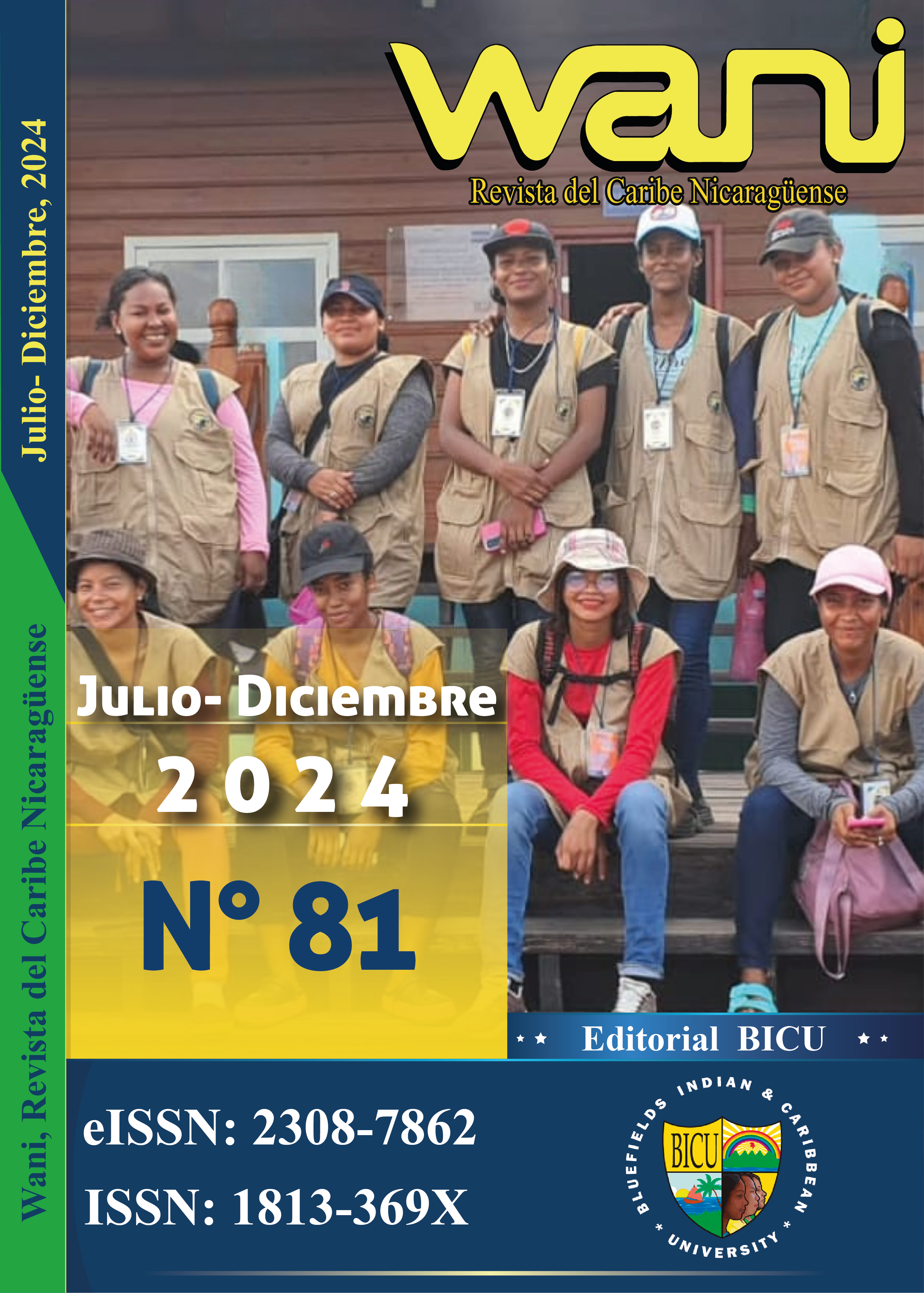I explore, activate, contextualize and share in the Nicaraguan secondary education learning process
DOI:
https://doi.org/10.5377/wani.v1i81.19429Keywords:
Evaluation, Didactic strategy, Interdisciplinarity, MathematicsAbstract
This descriptive essay addresses the applicability of the EACC strategy in the seventh grade of secondary education, whose acronym stands for: I Explore and Express my Ideas; Cognitive Activity, Applied Context, and I Share my Learning; with the purpose of creating an interdisciplinary subject that encompasses Education, Learning, Entrepreneurship, Prospering (EAEP), and Mathematics, though it can also be done with other subjects in the curriculum in close connection with the pedagogical practice which originated in 2021, whose title is “Interdisciplinary Relationship of the Didactics of Mathematics as a Science in Favor of Development With Other Subjects (RECIENTEC - UNAN-Managua; Regional University Center of Matagalpa)”, which presents guidelines and arguments to achieve interdisciplinarity. This antecedent was put into practice with the students, based on problem solving, the use of the PhET Simulator, the application of shared evaluation instruments, and the development of frameworks such as the linking of contents. The application of the strategy allowed both effective and affective communication between teachers and students, establishing the integrated planning of the class and its evaluations. Among the main significant findings, the creation of accounting tables for savings, the development of generic EAEP and grade-level competencies in Mathematics, and the learning of first-degree equations in the transposition of terms with the use of technology were evident. These elements allowed to conclude that interdisciplinarity and the integration of knowledge serve the lives of students.
Downloads
214
References
Briones Rugama, Y. Y., Hernández Alvarado, Y. E., Moreno Alfaro, M. L., y Triminio-Zavala, C. M. (2023). Metodología para la Construcción del Aprendizaje (MEPCA) en Trigonometría de educación secundaria. Revista Científica Esteli, 48, 85-107. https://doi.org/10.5377/farem.v12i48.17514
Cerda Torres, J. E., y Jarquín Matamoro, R. F. (2023). Importancia de la comunicación para la educación en el aprendizaje de la Matemática. Revista Torreón Universitario, 12(34), 1-6. https://doi.org/10.5377/rtu.v12i34.16337
Greca Dufrang, I. M., y Meneses Villagrá, J. A. (2018). Proyectos STEAM para la educación primaria. Fundamentos y aplicaciones prácticas. DEXTRA Editorial, 1-280. https://www.dextraeditorial.com/comprar/171/proyectos/steam/la/educacion/primaria/fundamentos/aplicaciones/practicas/ensenanza/stem/educacion/educacion/primaria/steam/desarrollo/competencial/indagacion/enfoques/metacognitivos/
Herrera Castrillo, C. J., y Jarquín Matamoro, R. F. (2024). Sistema de evaluación para el aprendizaje en educación media nicaragüense desde un modelo por competencia. Revista Multi - Ensayos, 10(19), 28-63. https://doi.org/10.5377/multiensayos.v10i19.17561
Huber, G. L. (2008). Aprendizaje activo y metodologías educativas. Revista de Educación, 59-81. https://www.metaaccion.com/images/descargas/aprendizaje_activo_metodologias_educativas_2008.pdf
Jarquín Matamoro, R. F. (2023a). Plan de Pizarra como metodología activa del aprendizaje significativo y amigable en Matemáticas para la educación secundaria en Nicaragua. Revista Científica de FAREM - Esteli, 12(45), 108-130. https://doi.org/10.5377/farem.v12i45.16040
Jarquín Matamoro, R. F. (2023b). Google Drive. Anexo al ensayo: Instrumentos de evaluación estrategia EACC: https://docs.google.com/document/d/1QSKtW1OwhBJWbP4q6z9woBZBZZ1lQ8Ci/edit?usp=sharing&ouid=100138451880938863466&rtpof=true&sd=true
Jarquín Matamoro, R. (2021). Relación interdisciplinaria de la didáctica de la Matemática como ciencia en pro del desarrollo con otras asignaturas. Revista Científica Tecnológica (RECIENTEC), 4(1). https://revistasnicaragua.cnu.edu.ni/index.php/recientec/article/view/7302
Ministerio de Educación (MINED). (2019). Guía para docentes de Matemática Séptimo grado. Educación Secundaria Regular (1ª ed.). Managua, Nicaragua: JICA.
Ministerio de Educación (MINED). (2022). Macro Unidad Pedagógica. IV ciclo, Secundaria Regular, Asignatura de Matemáticas. 1-51. https://nicaraguaeduca.mined.gob.ni/index.php/macro-unidad-pedagogica/
Ministerio de Educación (MINED). (2018). Malla curricular IV Ciclo Educación, Aprender, Emprender, Prosperar. Managua, Nicaragua. https://nicaraguaeduca.mined.gob.ni/wp-content/uploads/2019/12/AEP_IVciclo.pdf
Ministerio de Hacienda. (2024). Marco Presupuestario de Mediano Plazo 2024 - 2027. Ministerio de Educación. 270-299. http://www.hacienda.gob.ni/hacienda/ppresupuesto2024/mpmp/224.MinisterioEducacion.pdf
Pinell Tórrez, J. M., y Chavarría Zeledón, M. E. (2024). Gestión de la investigación, el conocimiento y emprendimiento desde la articulación de los subsistemas educativos. Wani, 1(81). https://doi.org/10.5377/wani.v1i81.19205
Saborío Rodríguez, M. y Herrera Moreno, L. E. (2023). Evaluación para el aprendizaje, una práctica para la mejora educativa y desarrollo humano pleno. Revista Índice Nicaragua, 3(5). https://revistaindice.cnu.edu.ni/index.php/indice/article/view/172/146
Downloads
Published
How to Cite
Issue
Section
License
Copyright (c) 2024 Bluefields Indian and Caribbean University

This work is licensed under a Creative Commons Attribution-NonCommercial-ShareAlike 4.0 International License.




